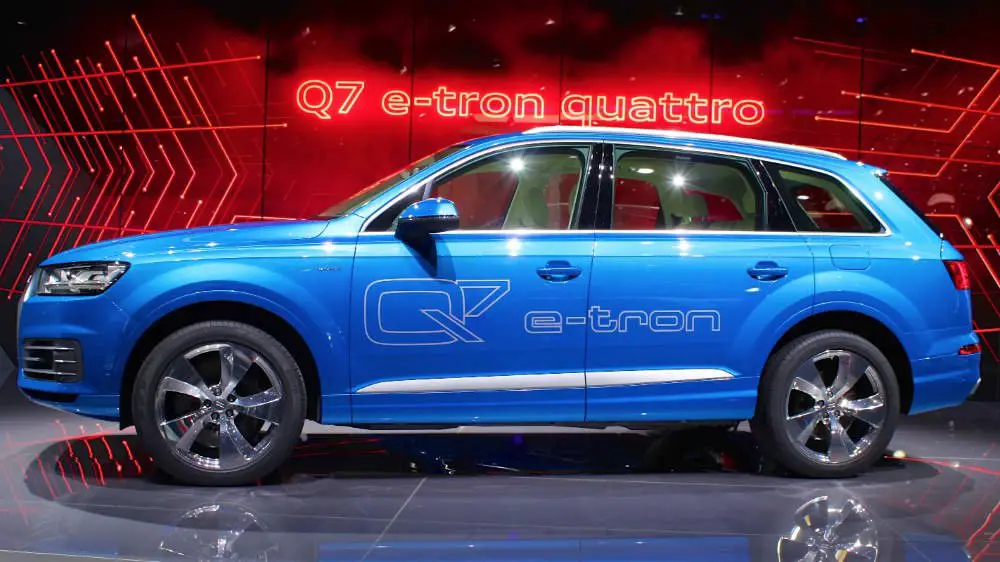 September 2015: Electric car sales continue to grow in Germany while new registrations of plug-in hybrid vehicles are up 150% this year. However, electric cars took only 0.3% of the total German new car market while 1.1% of new passenger vehicle registrations were for hybrid cars.
September 2015: Electric car sales continue to grow in Germany while new registrations of plug-in hybrid vehicles are up 150% this year. However, electric cars took only 0.3% of the total German new car market while 1.1% of new passenger vehicle registrations were for hybrid cars.
New Electric and Hybrid-Vehicle Registrations in Germany in 2015 (Q3)
New passenger vehicle registrations in Germany during the first nine months of 2015 for electric, hybrid and plug-in hybrids were as follows according to the KBA:
| Electric | % Change | Hybrid | % Change | Plug-in | % Change | |
| January | 659 | 21.8 | 1,893 | 0.7 | 593 | 323.6 |
| February | 436 | -9.4 | 2,061 | 10.0 | 686 | 448.8 |
| March | 1,278 | 55.3 | 3,151 | 25.2 | 886 | 467.9 |
| April | 684 | 14.2 | 2,891 | 25.2 | 1,006 | 233.1 |
| May | 574 | -38.5 | 3,073 | 14.4 | 1,054 | 97.0 |
| June | 1,032 | 27.4 | 2,944 | 15.2 | 754 | 137.9 |
| July | 962 | 61.1 | 2,859 | 30.2 | 944 | 105.2 |
| August | 831 | 61.4 | 2,128 | -10.9 | 570 | -8.1 |
| September | 929 | 24.4 | 2,940 | 29.4 | 1,038 | 160.8 |
| 2015 YTD | 7,385 | 22.1 | 23,940 | 15.8 | 7,531 | 146.7 |
| 2014 (Jan-Sep) | 6,047 | 20,672 | 3,053 | |||
| 2014 FY | 8,522 | 40.8 | 27,435 | 4.1 | 4,525 | 226.7 |
| 2013 FY | 6,051 | 105 | 26,348 | 23 | 1,385 | |
| 2012 FY | 2,956 | 21,438 | ||||
| Plug-in Hybrids are included in the hybrid total as well. | ||||||
Electric Car Sales in Germany in 2015 (January to September)
Registrations of new electric vehicles continued to grow in Germany this year but although above the market average, electric cars still had only a 0.3% market share of the total German new car market in 2015.
Thus far in 2015, only 7,385 new electric passenger vehicles had been registered in Germany – a fifth more than a year ago but far from the high numbers the German government were hoping to achieve. This number represented all electric cars authorized to be used on public roads including research vehicles and car-sharing companies. The KBA did not reveal how many electric cars were sold to private individuals.
Germany has as stated aim a million electric cars on the road by 2020 but this target looks increasingly unrealistic. Germany has fallen behind its smaller neighbors in both the total number and relative number of electric cars sold in recent years.
The German federal government recently changed the law that would allow local authorities to open bus lanes and free public parking to electric cars. However, thus far local authorities have shown little enthusiasm to be seen giving special privileges to richer car buyers – especially as large hybrid SUVs and luxury vehicles made by amongst others Porsche, Mercedes-Benz and BMW would also qualify. Furthermore, electric cars without the special equipment to influence traffic lights would cause traffic jams in bus lanes for buses that would otherwise receive priority to change lights in heavy traffic.
Hybrid Car Sales in Germany in 2015 (Q1-3)
New hybrid vehicle registrations in Germany increased by 16% to nearly 24,000 cars during the first nine months of 2015. This total included 7,500 plug-in hybrids (+147%).
Although hybrid car sales grew three times faster than the broader market, they still have only 1.1% of the complete German new car market. The number of hybrid car models available on the German market increased in recent months but despite the availability of cars from German producers, the price premium remained a major factor in preventing more sales to the public.
German carmakers have long maintained that the range of electric cars are simply too limited to make these cars attractive to German car buyers. This seems to be at least partly reflected in plug-in hybrids selling stronger than purely electric cars in Germany thus far in 2015.
